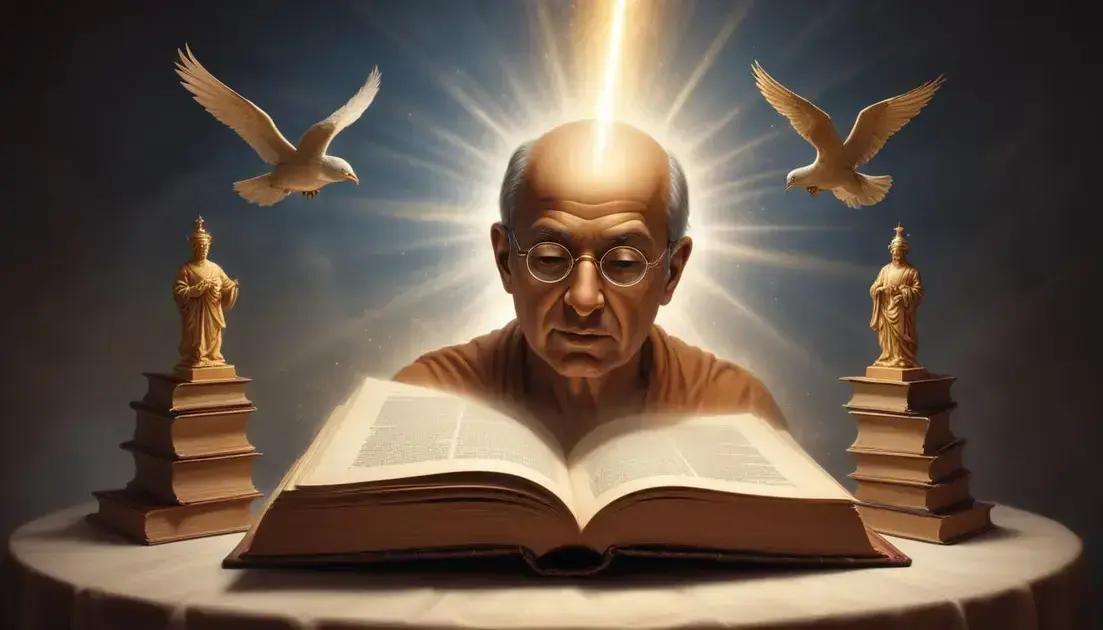
Enlightenment Literature: Reason in Words
The Enlightenment was a pivotal period that shaped modern literature and thought, emphasizing reason, individual rights, and the questioning of traditions. Key figures like Voltaire and Locke contributed to this movement by advocating for freedom and critical inquiry. Important works from this era inspired social change and continue to influence contemporary literature. Understanding Enlightenment themes remains essential for appreciating their ongoing relevance in discussions about human rights and societal progress.
Welcome to the exploration of Enlightenment literature! This fascinating era broke away from dogmas, advocating for freedom and social inquiry.
Introduction to Enlightenment Literature
The Enlightenment literature period was all about asking questions. Writers during this time wanted to challenge old beliefs and think for themselves. They focused on reason, freedom, and the idea that people could improve their lives through knowledge.
Key Themes in Enlightenment Literature
Writers often explored themes like liberty, science, and the power of the human mind. These themes encouraged people to think critically and question authority. Many famous works came from this period, inspiring future generations.
Famous Authors
Think about authors like Voltaire, Rousseau, and Kant. They all played significant roles in shaping Enlightenment ideas. Their writings sparked debates and encouraged new ways of thinking about society and government.
The Impact of Enlightenment Literature
This literature didn’t just entertain; it opened people’s eyes. It helped push for social change and reforms, leading to movements that challenged injustices. The ideas from this time still influence us today.
Key Figures of the Enlightenment
Several key figures shaped the Enlightenment movement. They challenged old ideas and crafted new ones. Their works inspired change across Europe and beyond.
Voltaire
Voltaire was a famous writer and philosopher. He used satire to criticize the government and the church. His ideas pushed for freedom of speech and religion.
John Locke
John Locke greatly influenced political thought. He believed in natural rights, like life, liberty, and property. His ideas inspired democratic movements worldwide.
Jean-Jacques Rousseau
Rousseau wrote about the social contract, explaining how society works. He believed people are generally good but can be corrupted by society.
Mary Wollstonecraft
Mary Wollstonecraft was a pioneer for women’s rights. She argued for educational opportunities for women, calling for equality in her famous work, “A Vindication of the Rights of Woman.”
These thinkers and many others paved the way for modern democracy, human rights, and social progress.
Important Works and Themes
The Enlightenment produced many important works that shaped thoughts and ideas. Key themes emerged, reflecting the spirit of the time.
Importance of Reason
Many writers emphasized reason as the primary source of authority. They believed humans could use logic and evidence to understand the world.
Social Contract
The concept of the social contract was central to Enlightenment thought. This idea suggests that governments gain power from the consent of the governed.
Individual Rights
Another vital theme was the idea of individual rights. Writers like John Locke argued that everyone has basic rights that should be protected.
Critique of Tradition
Enlightenment works often criticized traditions and customs. Thinkers encouraged questioning established norms and fostering new ideas.
Notable Works
Some famous works include “Candide” by Voltaire and “The Social Contract” by Rousseau. These texts challenged existing views and inspired change across Europe.
Impact on Modern Literature
The Enlightenment had a lasting impact on modern literature. Its ideas changed how writers think and create.
Shaping Themes
Writers today often focus on reason, freedom, and individual rights. These themes stem from Enlightenment ideas. They encourage readers to think critically about society.
Influence on Genres
The Enlightenment also influenced various literary genres. Genres like essays, novels, and political writings became more popular during this time. These forms remain influential in modern writing.
Character Development
Enlightenment literature emphasized complex characters. Modern authors often create relatable protagonists who challenge societal norms. This approach allows readers to connect deeply with their struggles.
Sparking Movements
The ideas from the Enlightenment led to many social movements. Writers now use their platforms to call for change. They shine a light on issues like equality and justice.
Continued Relevance
Todays literature continues to reflect Enlightenment themes. Books, films, and even social media often explore the importance of reason and human rights. Thus, the Enlightenment’s influence is still alive.
Conclusion
The Enlightenment period was crucial in shaping modern thought. Its ideas about reason, freedom, and rights still influence us today.
Writers and thinkers offered unique perspectives on society. They encouraged people to think critically and question traditions.
Through their works, they sparked conversations that led to significant changes. Enlightenment literature continues to inspire new generations.
By understanding these important themes, we can appreciate their lasting impact on literature and society.
Conclusion
In conclusion, the Enlightenment had a powerful impact on modern literature and thought. Its focus on reason, individual rights, and questioning traditions laid the foundation for many ideas we value today. Through their works, Enlightenment writers encouraged people to think critically and seek knowledge.
These themes continue to resonate in contemporary society. They inspire writers to address important issues and promote social change. Understanding the significance of the Enlightenment helps us appreciate its lasting influence on literature and our lives.
As we reflect on this era, let’s remember the importance of reason, creativity, and the pursuit of knowledge. The lessons from the Enlightenment remain relevant and can guide us in our journey for a better future.


